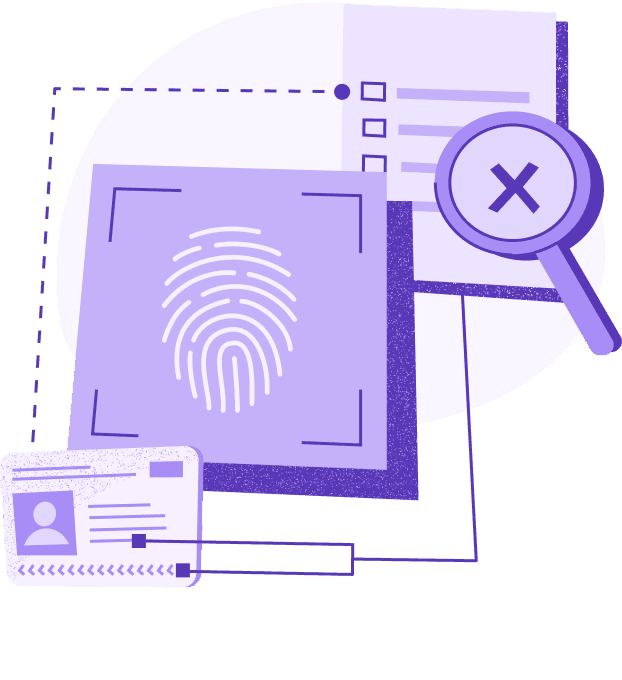Article
7 min read
A Guide to Employee Background Checks in Ukraine
Employee background checks
Legal & compliance

Author
Michał Kowalewski
Last Update
September 05, 2025

Table of Contents
What employers need to know before running background checks in Ukraine
Are background checks legal in Ukraine?
What types of background checks are illegal in Ukraine?
Industries where background checks are common in Ukraine
Types of background checks in Ukraine
Background check mistakes to avoid in Ukraine
Step-by-step guide to employee background checks in Ukraine
Key takeaways
- Background checks are important for mitigating risks and building trust, but they must comply with Ukraine's data protection laws. This means obtaining written consent, focusing on job-relevant information and avoiding discriminatory practices
- Criminal record checks, employment verification, and reference checks are common. Background checks are used heavily in finance, healthcare, education, government, an security and law enforcement due to the need for safety and regulatory compliance
- Employers should follow a clear process: obtain consent, verify education and employment history, conduct reference checks, and potentially screen social media (with consent). The entire process should be documented for transparency and compliance
Employee background checks should be an integral part of your hiring process in Ukraine. Although not mandatory, they are a common practice, especially in finance, healthcare, education, government agencies, security and law enforcement.
Despite the ongoing conflict, global companies facing talent shortages may consider Ukraine's skilled workforce, especially in STEM fields. Ukrainian professionals offer competitive rates, strong English skills, and are accustomed to remote collaboration. Their resilience and motivation, shaped by adversity, could provide companies with dedicated partners and contribute to Ukraine's economic recovery.
In such a volatile hiring environment, conducting thorough and compliant background checks can help global employers mitigate risks and build trust with qualified Ukrainian talent.
In this article, we’ll cover:
- How to run an effective and legal employment screening in Ukraine
- What the common types of employee background checks are in Ukraine
- What the step-by-step process of a thorough employee screening entails
- What mistakes employers must avoid when performing a background check in Ukraine
What employers need to know before running background checks in Ukraine
An employee background check is the process of verifying a potential hire’s work history, education, professional qualifications, and any criminal records they might have. It’s particularly beneficial to run before finalizing an employment offer or signing a contract, ensuring the candidate meets the company's standards and requirements
In Ukraine, employee background checks are governed by Ukraine’s Law of 1 June 2010 No. 2997-VI on Personal Data Protection (as amended) and the Ukrainian Parliament’s Commissioner for Human Rights, also called Ombudsman
-
Ukraine's Law of 1 June 2010 No. 2997-VI on Personal Data Protection is designed to regulate the processing of personal data to protect individuals' privacy rights. It establishes the principles for data processing, rights of data subjects, and responsibilities of data controllers. The law also outlines the conditions under which personal data can be processed and transferred, emphasizing the need for data subjects' consent and legal compliance
-
The Ukrainian Parliament's Commissioner for Human Rights, also known as the Ombudsman, is responsible for monitoring and ensuring compliance with personal data protection laws in Ukraine. This office plays a crucial role in overseeing the lawful processing of personal data and protecting individuals' rights concerning their personal information
It’s worth noting that the conflict in Ukraine could affect how laws are implemented, including data protection rules. War conditions might lead to changes or pauses in some legal standards to meet national security needs. Still, the main aims of data protection, like safeguarding personal rights, are expected to continue, possibly with some war-related adjustments.
Are background checks legal in Ukraine?
Background checks are legal in Ukraine, provided they comply with the country's data protection and privacy laws.
Employers are permitted to conduct pre-employment background checks, including verification of educational credentials, employment history, and criminal records, as long as the process aligns with the legal requirements.
However, it is crucial for employers to obtain the candidate's consent before initiating a background check, as mandated in Ukraine's Law of 1 June 2010 No. 2997-VI on Personal Data Protection. Although it’s not specified in the law, written consent is recommended for documentation and compliance purposes.
Background checks
What types of background checks are illegal in Ukraine?
The Ukrainian privacy laws set strict boundaries for employee background checks. Here's what global employers should absolutely stay clear of:
- Trying to obtain sensitive or private information: Background checks cannot delve into a candidate's genetic information, medical history, or political affiliation. These are highly sensitive areas, and employers have no legal right to access such information
- Discriminatory inquiries: Avoid questions that could lead to discrimination based on factors like race, religion, ethnicity, sexual orientation, or union membership
- Not focusing on job relevance: Background checks should focus on information relevant to the job and the candidate's ability to perform the duties. This may include education verification, employment verification, and criminal record checks (with consent)
Industries where background checks are common in Ukraine
Background checks are a common practice in Ukraine, particularly in sectors where safety, security, and regulatory compliance are paramount. Here's a breakdown of industries that heavily utilize background checks:
- Finance: Financial institutions like banks and investment firms deal with sensitive financial information and client assets. Background checks play a vital role in ensuring the integrity and trustworthiness of employees, mitigating potential risks associated with fraud or financial misconduct
- Healthcare: Patient safety and well-being are paramount in healthcare. Background checks help verify the qualifications and credentials of medical professionals, while also screening for any criminal history that could pose a threat to patients
- Education: Schools and educational institutions may conduct background checks on teachers and staff, particularly those working with children, to ensure the safety and well-being of students
- Government agencies: Government positions often involve access to confidential information and require a high degree of trust. Background checks help ensure that individuals employed by government agencies meet the necessary security clearances and possess the integrity to uphold public trust
- Security and law enforcement: Security companies and law enforcement agencies require employees with a clean criminal record and a trustworthy background due to the sensitive nature of their work
Types of background checks in Ukraine
Effective employment screening in Ukraine covers essential aspects to evaluate a candidate's abilities. Knowing these areas helps employers tailor screening processes to meet job requirements and legal standards.
| Type of Check | Common in Ukraine? | Reason |
|---|---|---|
| Criminal record check | Common | Widely used across industries to assess a candidate's criminal history and ensure workplace safety |
| Employment history verification | Common | Essential for confirming a candidate's work experience and assessing their qualifications for the position |
| Reference check | Common | Employers frequently contact provided references to gain valuable insights into a candidate's professional conduct and performance |
| Credit history check | Less common | While less prevalent, some financial institutions may request credit history checks to evaluate a candidate's financial responsibility |
| Professional license verification | Common | Commonly utilized in regulated industries to validate the authenticity of a candidate's professional licenses or certifications |
| Drug testing | Less common | While typically less common, drug testing may be implemented in safety-sensitive industries to maintain a secure working environment |
Background check mistakes to avoid in Ukraine
Whether you’re hiring employees or contractors in Ukraine, there are a few things you shouldn’t do as an employer when it comes to background checks:
- Omitting consent: Employers must obtain explicit consent from the candidate before initiating any background checks. This is in line with Ukraine's strict data protection and privacy laws, ensuring that the process respects the individual's rights.
- Limitations on information: Ukrainian laws restrict the types of information that can be collected during background checks. This means focusing on information that is directly relevant to the job role, such as employment history, criminal records (with consent), and educational qualifications
- Avoid discriminatory practices: It's important to ensure that background checks are not used to discriminate against candidates based on protected characteristics such as age, gender, or ethnicity. All hiring practices should be fair and equitable.
- Incomplete verification: Relying on accurate and verified information is crucial. Employers should ensure that the data collected during background checks is complete and verified to avoid making decisions based on inaccurate information
- Transparency with candidates: Clear communication with candidates about the purpose and scope of background checks fosters trust and transparency. It's essential to inform candidates about what checks will be conducted and why they are necessary for the role
Compliance
Step-by-step guide to employee background checks in Ukraine
Employers looking to hire in Ukraine should follow the list of steps below to ensure legal and effective and thorough employee background checks.
- Obtain consent: Before initiating a background check, obtain written consent from the candidate, clearly stating the purpose and scope of the check
- Verify educational credentials: Validate the candidate's educational qualifications through official channels, such as educational institutions or relevant authorities
- Check employment history: Confirm the candidate's work experience by contacting previous employers or using professional verification services
- Check criminal record: Conduct a criminal record check through the Ministry of Internal Affairs to ensure the candidate does not have a criminal history that would impact their suitability for the position
- Check credit history: While less common, some employers may request a credit history check through authorized credit bureaus to assess a candidate's financial responsibility
- Check references: Reach out to the candidate's provided references to gain insights into their professional conduct and performance
- Screen social media: Review the candidate's public social media profiles to assess their online presence and ensure alignment with the company's values
- Financial history check: For relevant roles in financial institutions, perform a check on their financial background to evaluate their reliability in managing finances
- Document the process: Record each step in the background check, noting the candidate's permission, data collected, and reasons for its use, ensuring compliance and clarity
- Decision making: Use the results from the background check to make well-informed hiring choices, while ensuring fairness, transparency, and adherence to privacy laws
You can also automate this process using Deel, and get a fast employee background check, with results coming in a matter of minutes.
Many of our processes and compliance certifications require that we conduct background checks on all full-time consultants and employees of the company. Deel makes this easy as the background check is a seamless add-on during the onboarding process. It's quick, there's no duplication of information, and the report is saved within the team member's profile for easy reference in the future.
—Audrey McNicholas,
Head of Business Operations, Condor
Run employee background checks with Deel
There’s no need for HR to log into yet another platform or manually chase documents. With screenings in over 200 countries and territories (and counting), for employees and contractors, you can manage background checks for global hires with a single source of truth without leaving the Deel platform.
Are you looking for an easy and safe way to run a background check? Get results within minutes with Deel.

Michał Kowalewski a writer and content manager with 7+ years of experience in digital marketing. He spent most of his professional career working in startups and tech industry. He's a big proponent of remote work considering it not just a professional preference but a lifestyle that enhances productivity and fosters a flexible work environment. He enjoys tackling topics of venture capital, equity, and startup finance.
















